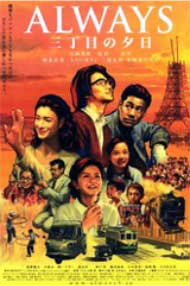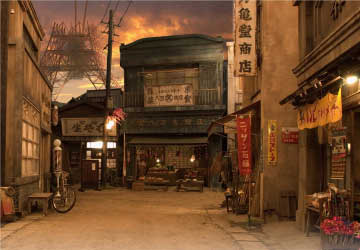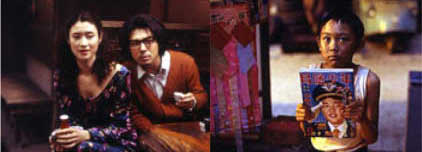Always, Sunset on Third Street
(Always--3-chome no Yuhi)

Director: Takashi Yamazaki
Year: 2005
Running Time: 133 minutes
Production Company: Toho
It’s 1958 and the city is Tokyo. It is still a jumbled patchwork of
distinct tiny neighborhoods, small personable stores, narrow winding streets
and a sense of community among the people who live there. Thirteen years
after the end of the war, the country is finally pulling itself out of its
depression and the economic miracle that is to come is just on the horizon.
As a sign of its emergence into the modern world, the Tokyo Tower is under
construction and hangs over the film as a symbol of pride and hope of things
to come. Director Takashi Yamazaki couldn’t have made a film more different
than his pop sci-fi exercise, Returner (2002), with this sweet nostalgic
look backwards at a simpler time when a neighborhood would turn out en masse
to watch a new black and white television set showing Rikidozan in a wrestling
match, a fountain pen was a magical Christmas gift, doctor’s made house calls
and everyone knew their neighbors by name. This film touched a sentimental
nerve with audiences in Japan with a big box office turnout and a near sweep
of the Japanese film awards by winning twelve of the possible thirteen categories.
For many this old fashioned very mainstream film will likely prove too sentimental,
too soft, too tender, too clichéd but somewhere along the way I fell
under its warm butterscotch optimism and it made me long for simpler times
as well.
 The film focuses on a few particular characters though others waft through
it such as the ice delivery man who sees his profession being eased out by
technology – the refrigerator (my grandfather was in the same line of work,
but he unfortunately died before I was born). A young girl Mutsuko (Horikita
Maki) is on a train coming from her small village to work in Tokyo. She has
been hired to work at the Suzuki Automobile Company and is excited at the
thought of working for a large company and dreams of being a secretary to
the big boss in his upscale office. She is personally met at the station
by the President of Suzuki, Norifumi (Tsutsumi Shin'ichi) and he drives Mutsuko
to her work place – which much to her dismay is a small auto repair company
and she discovers to her shock that she is expected to repair cars! Norifumi
had misread her resume – car repair for bicycle repair - and complications
and accusations ensue.
The film focuses on a few particular characters though others waft through
it such as the ice delivery man who sees his profession being eased out by
technology – the refrigerator (my grandfather was in the same line of work,
but he unfortunately died before I was born). A young girl Mutsuko (Horikita
Maki) is on a train coming from her small village to work in Tokyo. She has
been hired to work at the Suzuki Automobile Company and is excited at the
thought of working for a large company and dreams of being a secretary to
the big boss in his upscale office. She is personally met at the station
by the President of Suzuki, Norifumi (Tsutsumi Shin'ichi) and he drives Mutsuko
to her work place – which much to her dismay is a small auto repair company
and she discovers to her shock that she is expected to repair cars! Norifumi
had misread her resume – car repair for bicycle repair - and complications
and accusations ensue.
 Across the street is a dusty not very bustling candy store that is run
in desultory fashion by Chagawa Ryunosuke (Yoshioka Hidetaka), a mop headed
irritable fellow who prefers to immerse himself in his writing. He writes
children stories but hasn’t made much of a success at it and seems annoyed
at everyone and everything in his perceived failed life. One evening while
in his drinks at the local bar, he tries to falsely impress the new pretty
barmaid, Hiromi (Koyuki - "The Last Samurai"), with his liking for children
and the next he knows he is drunkenly agreeing to take in Junnosuke, a young
boy who was abandoned by his mother and was just recently stuck with Hiromi.
Hiromi is a former hostess trying to get away from that life and feels in
no position to handle a boy. When he wakes up the next morning and finds
this silent boy watching his every move he just wants to be rid of him “we
aren’t relatives, not even friends”, but is pleased when he discovers the
boy is an avid reader of his submissions to the magazine “Boy’s Adventures”.
Across the street is a dusty not very bustling candy store that is run
in desultory fashion by Chagawa Ryunosuke (Yoshioka Hidetaka), a mop headed
irritable fellow who prefers to immerse himself in his writing. He writes
children stories but hasn’t made much of a success at it and seems annoyed
at everyone and everything in his perceived failed life. One evening while
in his drinks at the local bar, he tries to falsely impress the new pretty
barmaid, Hiromi (Koyuki - "The Last Samurai"), with his liking for children
and the next he knows he is drunkenly agreeing to take in Junnosuke, a young
boy who was abandoned by his mother and was just recently stuck with Hiromi.
Hiromi is a former hostess trying to get away from that life and feels in
no position to handle a boy. When he wakes up the next morning and finds
this silent boy watching his every move he just wants to be rid of him “we
aren’t relatives, not even friends”, but is pleased when he discovers the
boy is an avid reader of his submissions to the magazine “Boy’s Adventures”.
 There is no specific narrative thread to the film. It simply follows
the lives of these people for a period of time and the emotional touch points
along the way. Mutsuko becomes a near member of the Suzuki family as they
(father, mother, son) take her into their hearts, mom gets the holy trinity
– television, refrigerator and washing machine – Ryunosuke discovers his
humanity in caring for a little boy, Hiromi dreams of having a family someday,
the neighborhood doctor dreams of his wife and daughter who died in an air
raid and life goes on – and in the background the Tokyo Tower raises itself
from the ashes of the war pointing to a better tomorrow. Of course, the film
leaves you wondering whether that better tomorrow has actually arrived with
the onslaught of technology and wealth and it seemingly pines for those days
when the country was just getting back on its feet and the future looked
so hopeful. If you have a heart and a penchant for the sentimental, I would
be surprised if this film didn’t touch it. It is based on a Manga.
There is no specific narrative thread to the film. It simply follows
the lives of these people for a period of time and the emotional touch points
along the way. Mutsuko becomes a near member of the Suzuki family as they
(father, mother, son) take her into their hearts, mom gets the holy trinity
– television, refrigerator and washing machine – Ryunosuke discovers his
humanity in caring for a little boy, Hiromi dreams of having a family someday,
the neighborhood doctor dreams of his wife and daughter who died in an air
raid and life goes on – and in the background the Tokyo Tower raises itself
from the ashes of the war pointing to a better tomorrow. Of course, the film
leaves you wondering whether that better tomorrow has actually arrived with
the onslaught of technology and wealth and it seemingly pines for those days
when the country was just getting back on its feet and the future looked
so hopeful. If you have a heart and a penchant for the sentimental, I would
be surprised if this film didn’t touch it. It is based on a Manga.

My rating for this film: 7.5





